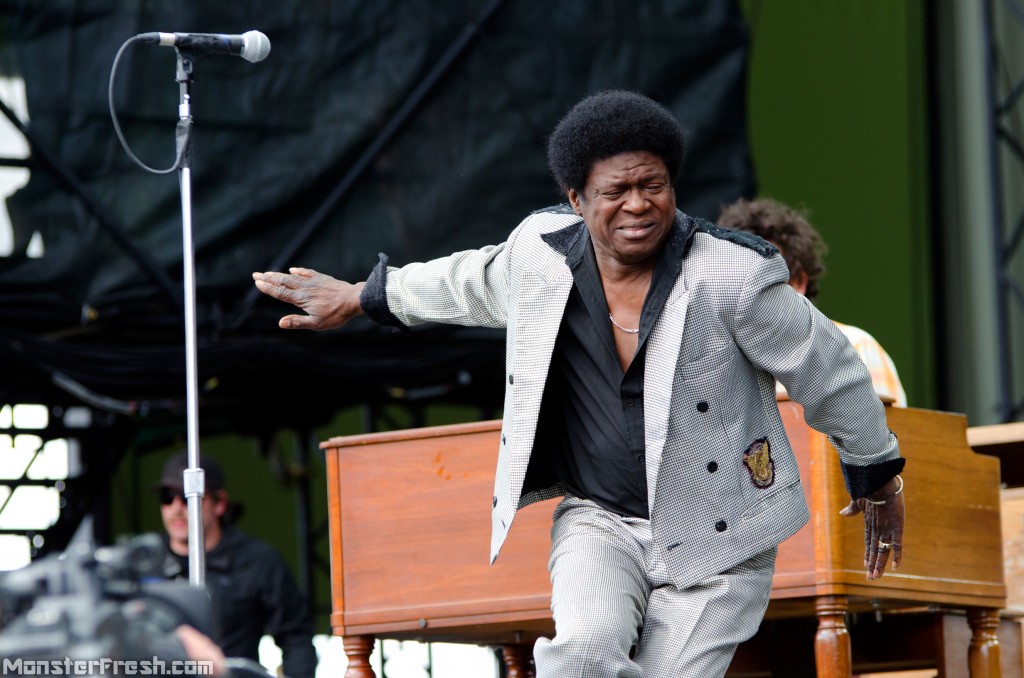DAY TWO (pt.1) : Sasquatch! Music Festival 2012 [Charles Bradley]
A review of Charles Bradley’s awe-inspiring 1pm Saturday performance with plenty of photographs and background information
[CLICK HERE to read Day 1]
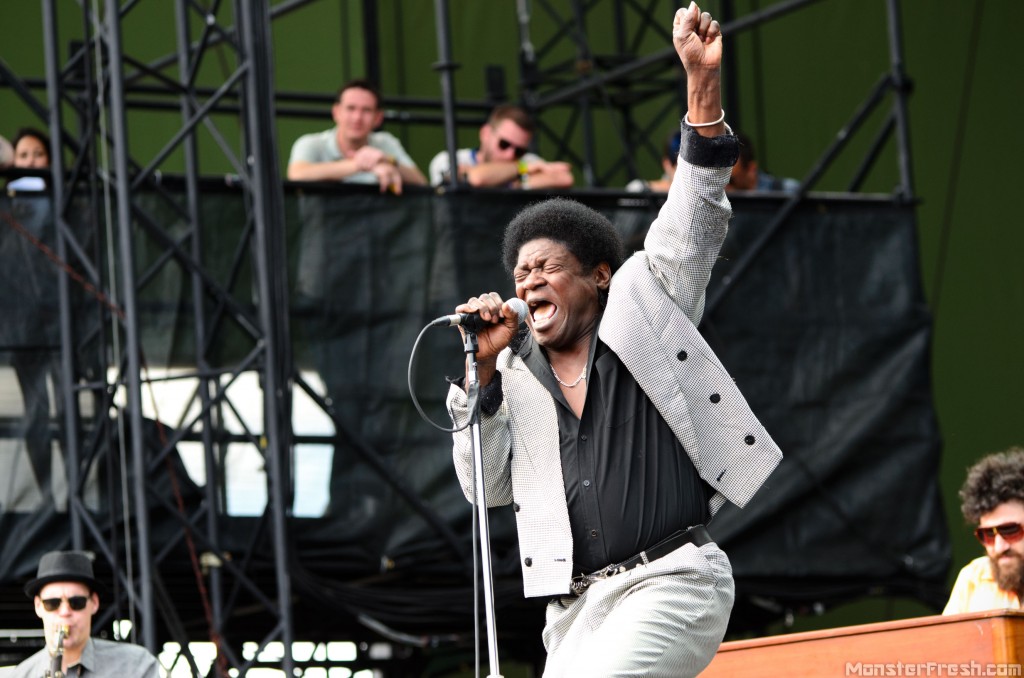
I woke up in a makeshift nylon convection oven. The mesh openings in my Coleman 3 person tent do little but make sure that the heat is circulated enough to cook each part of my body equally. It’s like this at the Gorge every time that I go there and, while I went to sleep focused on getting up early enough to be in the venue by noon, I knew that it probably wasn’t going to be an issue. As usual, the heat shook me out of my tent at around 8am. The weather typically cools off in the evening, but this year the temperature mellowed out after early morning and never got too insane, allowing me bring a hoodie in without sweating too bad or freezing when the sun went down.
I got up, ate a blueberry muffin and some satsumas, sat in my car to charge my camera and phone batteries, and then… nothing. I was trying to be super proactive and organized, but that still just left me with hours to kill before Charles Bradley and His Extraordinaires would take the stage at 1:05.

Charles Bradley and his Extraordinaires
When the lineup for a large festival such as this gets announced, it can look really amazing, but it can also feel daunting and overwhelming. Once the schedule finally gets posted, the bands are distributed between 4 separate days, and the minor acts that you could go either way about are booked at the same time as some of your must-see performers, it can suddenly form much larger gaps in the weekend than you might have anticipated. This can actually be a good thing, because it allows attendees to take a break, as well as an opportunity to check out/discover new acts, which is, arguably, one of the greatest benefits of the entire festival format. It also means that a good percentage of your interactions might involve people asking you what you plan on seeing, and vice versa, just to get some suggestions about how to spend those potential lulls throughout the weekend. Not surprisingly, the planned schedules of most folks were checked with big name acts like Jack White and Beck, young hyped up and comers like Alabama Shakes and The Sheepdogs, and over hyped local acts like Thee Satisfaction and Don’t Talk to the Cops. Whenever I was asked what I had come to see, the answer was simple: an early afternoon set by a soul singer in his mid-Sixties.
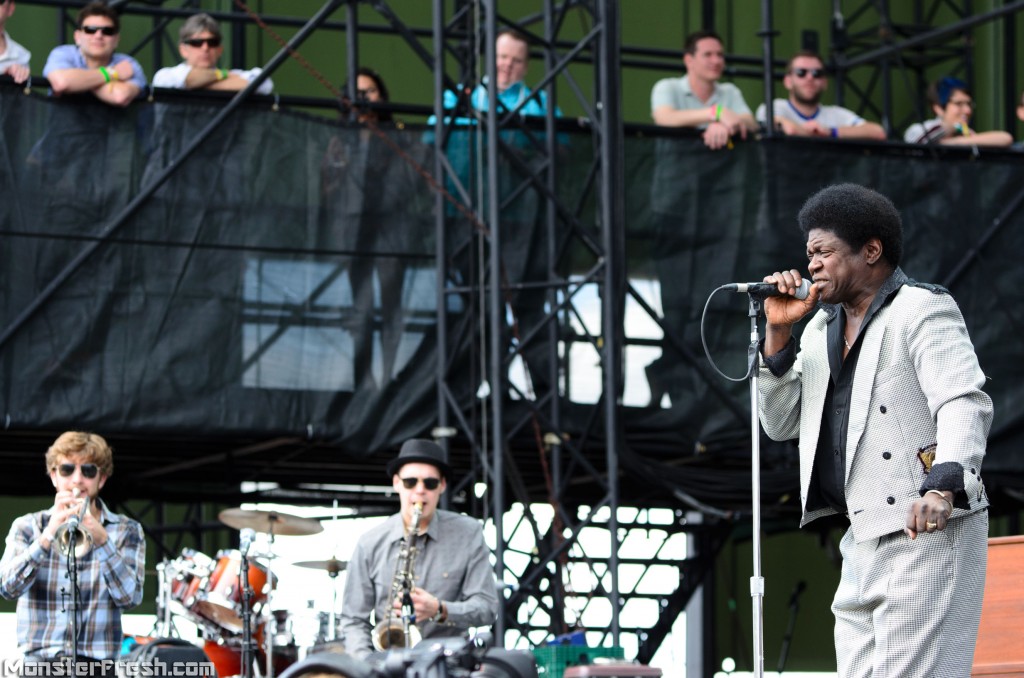
Charles Bradley‘s band took the stage before he did. There was the typical guitar bass and drums, but with such additions as an organist and a couple of horn players sprinkled in, so that even those unfamiliar with his work would know that there was going to be something with a groove heading their way. I’m not exactly sure what his current band, the Extraordinaires, consists of persona-wise. If memory serves me correctly, some of the first musicians that Charles worked/recorded with after linking up with the Daptone label was a group called the Bullets that eventually mutated into the Budos Band. From there, guitarist/producer, Thomas Brenneck formed the Menahan Street Band which, besides putting out their own wildly successful album, Make the Road by Walking–sampled by Jay z, Kid Cudi, & 50 cent–they are also the group that’s been backing Charles for the last year or so and were featured on his album, No Time For Dreaming. Perhaps the Extraordinaires are a backing band that Charles can finally and officially claim as his own, rather than borrowed accompaniment. For this new outfit, I noticed that Budos and Menahan Steet Band organist, Mike Deller had carried over, along with Thomas Brenneck, who has continued to be a driving force in Bradley‘s career over the years. In fact, Brenneck was the one who encouraged Charles to dig in and craft autobiographical songs that derived from his own personal and tumultuous history. These are the tunes that eventually became No Time for Dreaming; an album that Brenneck produced and released on his own Daptone subsidiary, Dunham Records; an album that would become Charles Bradley‘s debut full-length at the ripe age of 62.
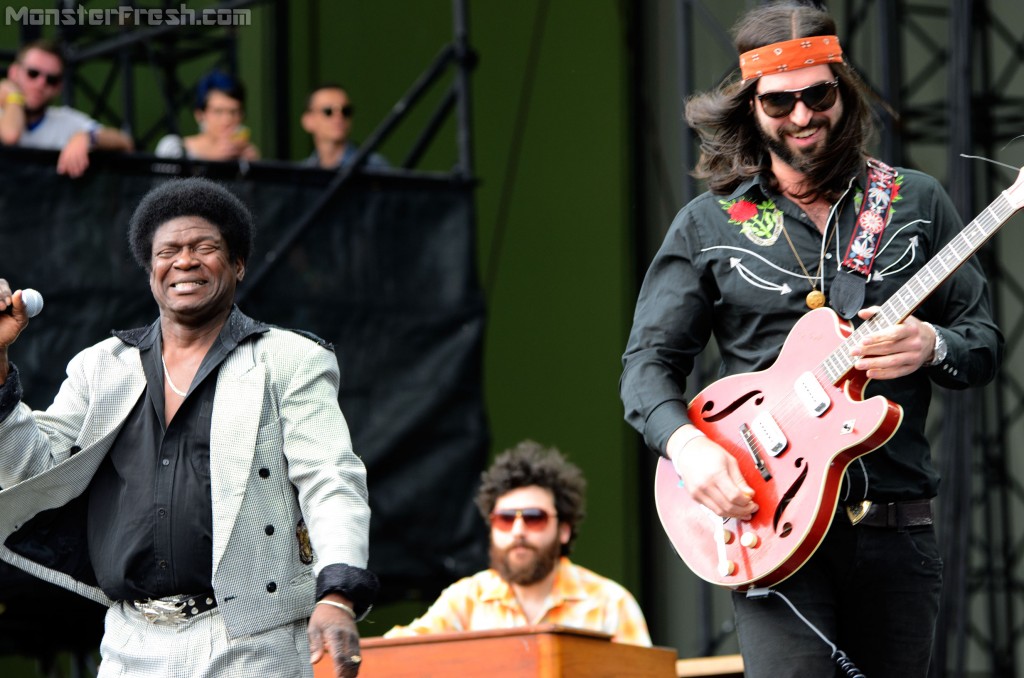
Once they were all set up, Deller took the mic and introduced Charles using his nickname, “The Screaming Eagle of Soul!” Bradley entered in a herringbone suit with large appliqué eagle wings covering the majority of the backside of his jacket. His black dress shirt was unbuttoned down to his sternum, exposing a silver chain, and the matching belt buckle was in the shape of a large crab or sun-like figure that I couldn’t quite make out. The frontman had been working as a James Brown impersonator and calling himself “Black Velvet,” prior to coming into his own and releasing original material. The swagger and moves aren’t something that he’s let go of, but they definitely aren’t the focal point of his shows anymore; Charles leads with the soul.
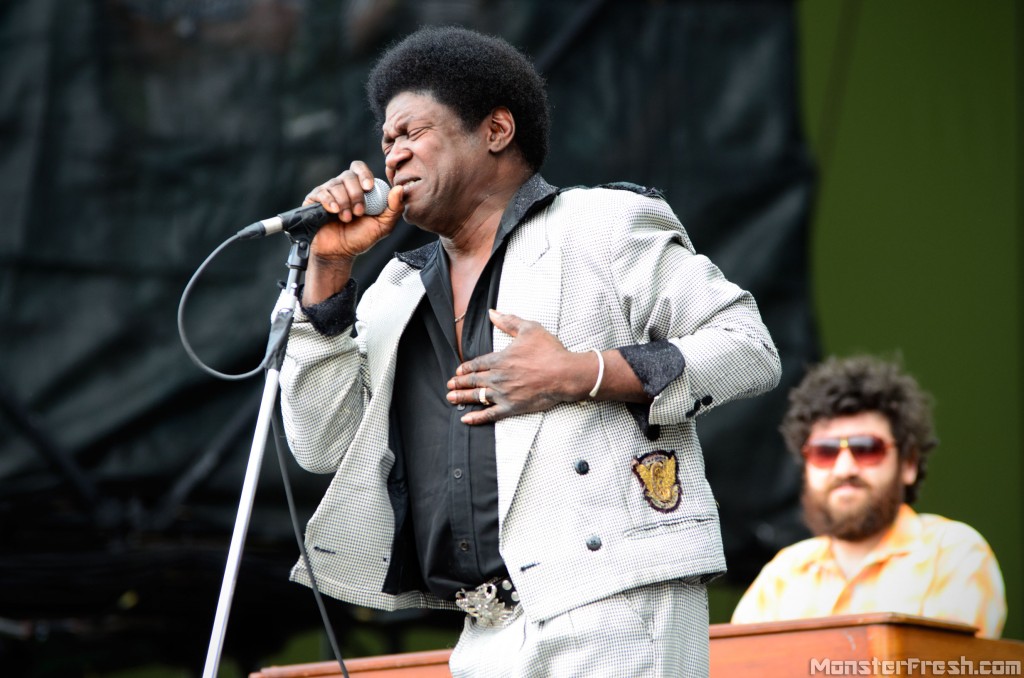
The first track that he performed was “Heartaches and Pain” and the title is in no way an exaggeration of the content. The subject matter revolves around one morning when he woke up to the sound of his crying mother–a mother who, more or less, abandoned him at an incredibly young age, but who he moved in with and helped take care of in her late years. Seeing flashing police lights, he soon discovered that his brother, who lived in the same neighborhood, had been murdered by his nephew. After pushing his way through the police and dismissing their warnings, his mind was forever scarred with the imagery of the brain matter on the floor–blasted from his brother’s skull with the aid of a hollow point. This is an intense track and an intense, yet effective, way for Bradley to introduce himself. The guttural howls and powerful delivery are strikingly tangible. It’s as if he’s feeling these songs with every piece of his being, each and every time that he reaches down inside to exhume his skeletons for a new audience.
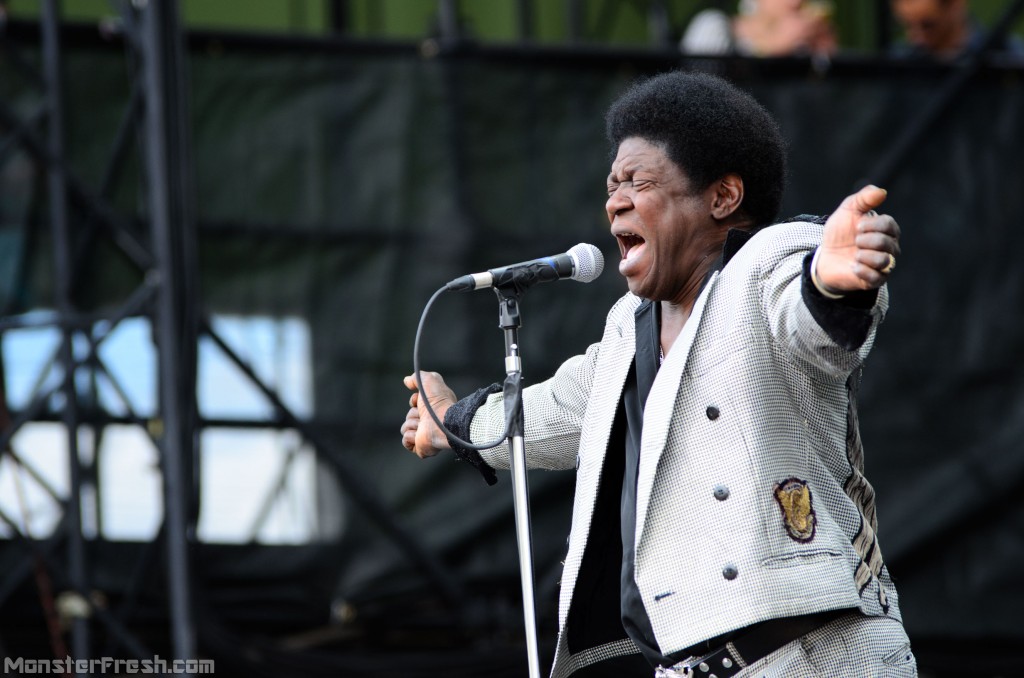
One of the most amazing things about Charles Bradley is his positive spirit. While many of his tracks, admittedly, focus on dire and tragic circumstances, they are always presented with and underlying current of hope. He followed up the opener with the title track to No Time For Dreaming and, as the name implies, it’s a song about pushing harder with a message that, if you do, your “break” will eventually come. After all, it took Charles 48 years to realize his own dream. He was originally discovered by Daptone records co-founder, Gabe Roth while doing his Black Velvet routine, and brought into work with the label when he was already 51 years of age. But it would still be another 11 years before Thomas Brenneck found himself moving near Charles in Brooklyn, where he was able to coax an albums worth of amazing, raw, and heartfelt lyrics out him with his guitar. Sure, Bradley‘s lyrics reveal plenty of pain, but they also reveal unwavering strength and resilience. The sheer fact that he’s able to perform for us at all is revealing enough: we know that the story gets better and that their will be a silver lining. The most that Charles might ask is why things have to be so difficult or when the pain will finally end, but he never asks if it will. As he sang the song, “How long,” the following lyrics jumped out at me:
“I talked my brother the other day
he said brother
please, gimme a little fix
huh
I look at him and said
brother, don’t leave me“
This may or may not be the root of these lyrics but, in looking deeper into Charles’ story, I discovered that there was a period of time when he lived amongst heroin junkies; some of which even asked him to shoot them up. This was during his time living on the streets and sleeping in subway cars, which began when he was 14 and continued until he discovered and joined job corp. This resulted in him being trained to cook and then bouncing around, taking random chef gigs, relocating around the country, and struggling financially and in other ways for decades to come. Coincidentally enough, 14 was also the age that one of the most life changing events took place for him, when his sister took him to see James Brown and he discovered his calling in music. When he eventually moved back to Brooklyn, it coincided with his goal to refocus more on music and, through embarking on his Black Velvet (aka: James Brown Jr) routine, his life had come somewhat full circle.
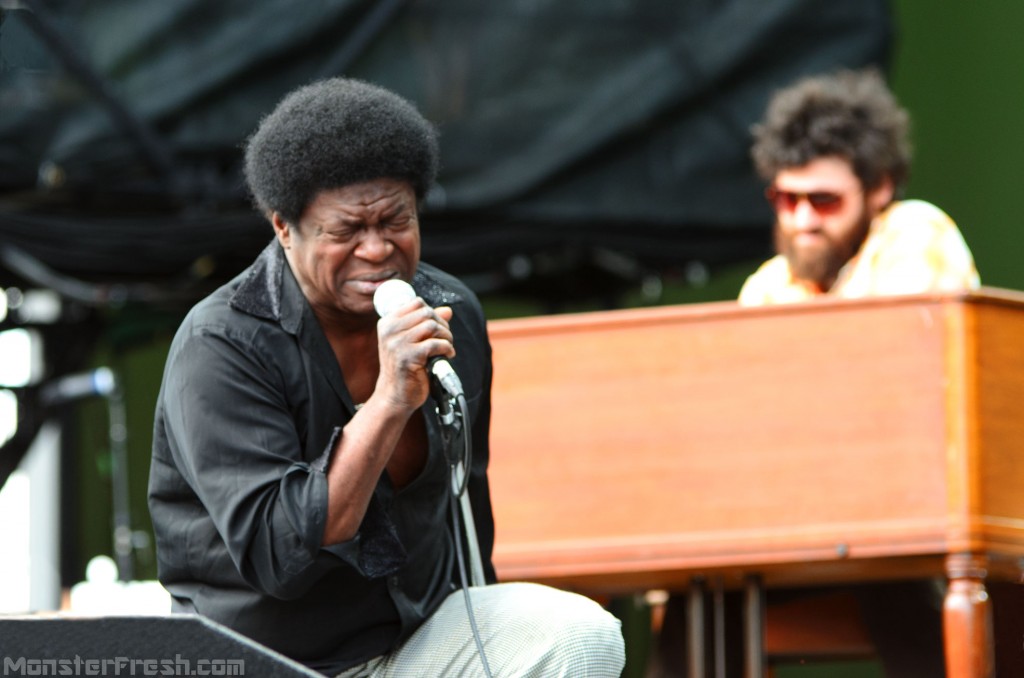
Bradley didn’t just connect with the audience by exposing his struggles, he swept us up into his infectious grooves, as well. Charles ripped off his jacket mid-song, spun around, leaned back screaming into the microphone, and even dropped to his knees. With his arms out wide at his sides, he thrusted his hips aggressively forward. On more than one occasion, he’d drop the mic stand, catching the base with his foot and springing it back into his hands. He even knelt with the entire mic stand resting over his shoulder and tore up a full-on James Brown-style breakdown, complete with him doing the robot. While his moves were reminiscent of the late Godfather of Soul and were, undoubtedly, perfected during his tenure emulating him, they didn’t come across as mere impersonations. The moves and the fire that fueled them were 100% Bradley. As with everything else that he had offered up, they were coming from deep within himself. And out of all of his spins and knee drops, the one move that was the most telling came after the songs when Charles would gently put his praying hands together and delicately bow in silent appreciation for the love that was being returned to him.
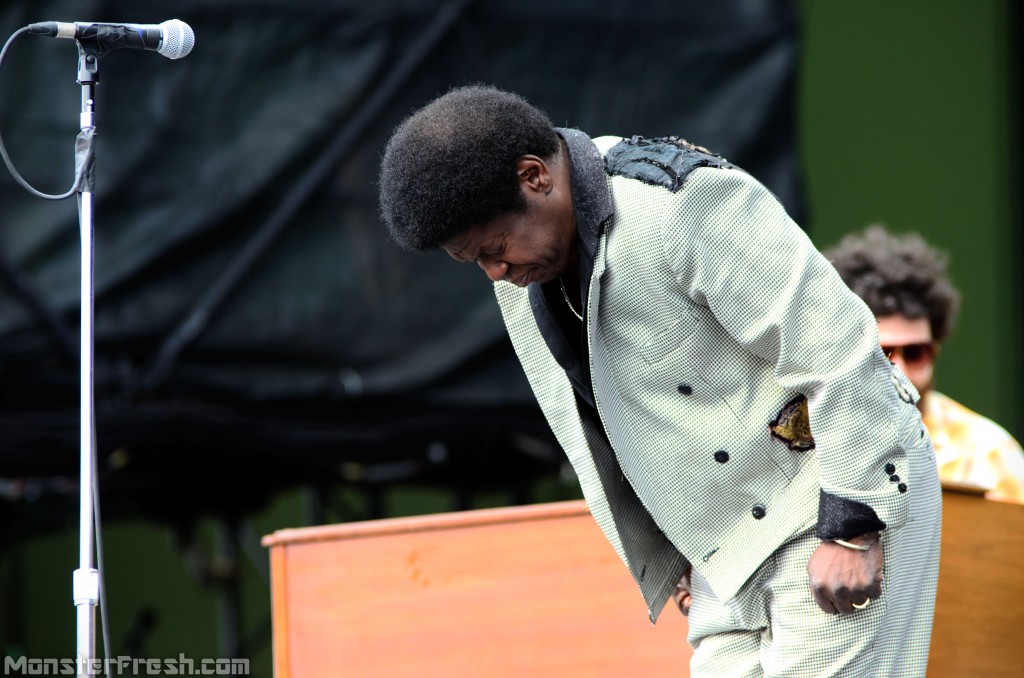
Charles closed out his set with one of his strongest tracks, “Why is it so Hard?” The song, which pleads for an answer to the question, “Why is it so hard to make it in America?” operates as somewhat of a quick bio for the soul singer. He begins referencing his birth in Gainesville, Fl, where he was being raised by his grandmother–he didn’t meet his mother until around the age of 7 or 8. He then mentions his travels across the country; and his return to Brooklyn, where his mother had originally relocated him, when they met in his youth; while exploring the concept of how easy it can be to lose faith and why those feelings are so understandable. He had delivered us powerful tunes about the decline of civilization (“The World (Is Going Up in Flames)”) and inspirational songs about how we could collectively work to reverse such damage (“Golden Rule”), but “Why is it so Hard?” felt like the most poignant of them all.
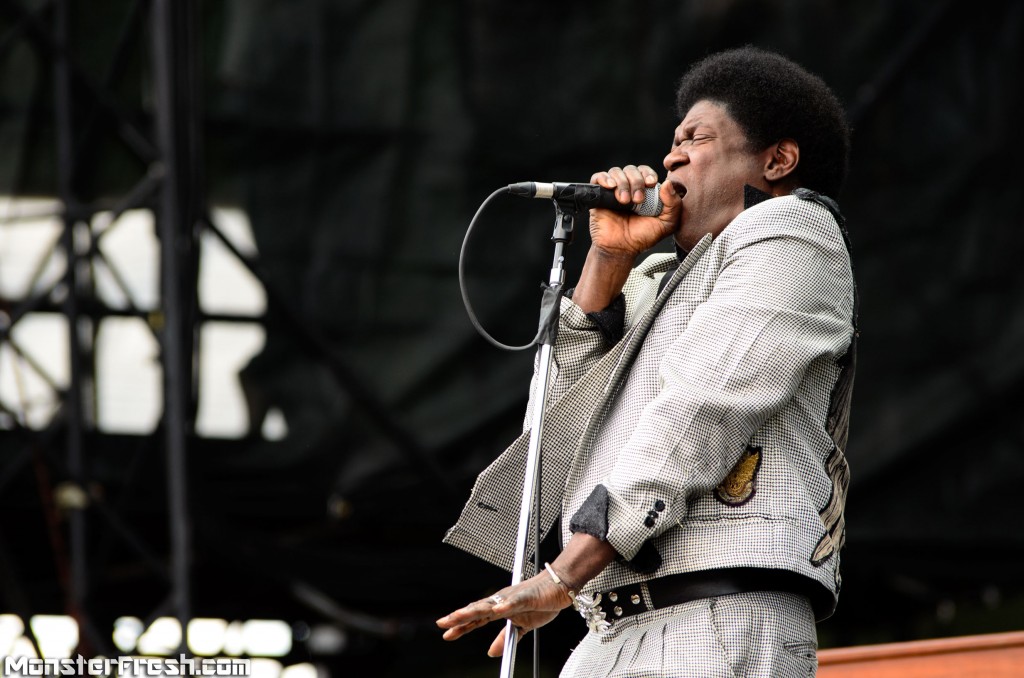
On paper, this set shouldn’t have been successful at all: a soul singer pushing his mid-sixties, playing a 1pm set at a festival to a bunch of young kids on a main stage that would later be occupied by the likes of Childish Gambino. It would seem that Charles would fare better if he was scheduled later in the evening in a slightly smaller and more intimate arena, but that’s what was so amazing; he, somehow, still managed to make it seem intimate and the sheer fact that he was on the main stage at all provided both his message and journey with an even greater impact. Through all of the years and everything that he’s been through, here he was with thousands of people hanging on his every word and there is no way that you could ever find anyone that was more genuinely and openly appreciative to be in that position.
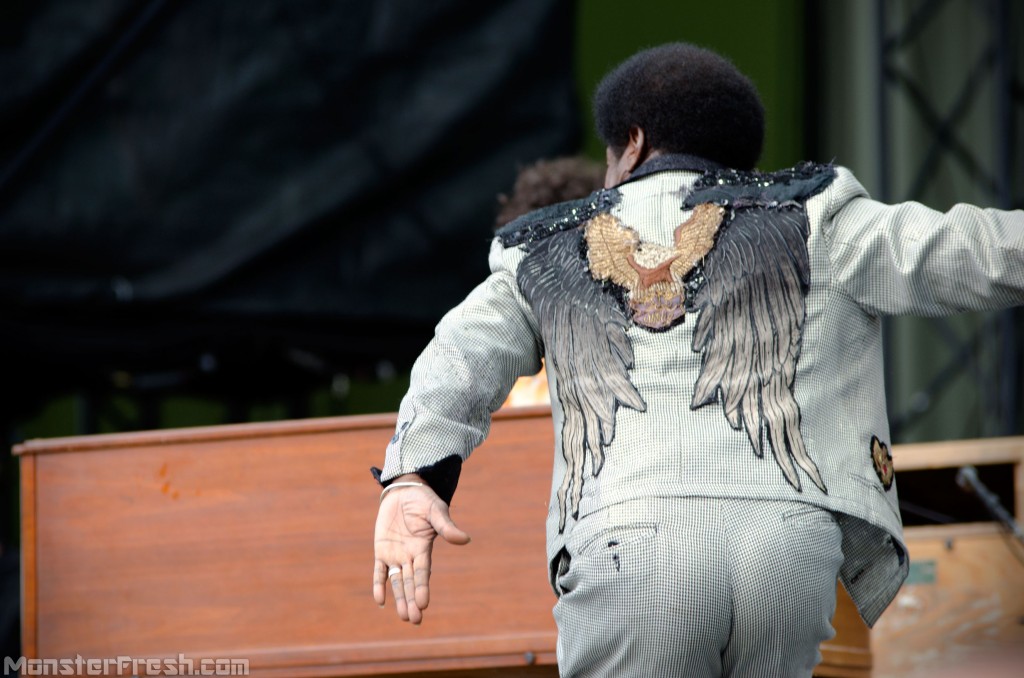
Charles‘ music isn’t all about mourning and tragedy, it’s a celebration of life, strength, beauty, and empowerment. He never comes across as bitter or angry, only uplifting and grateful. Towards the end of the set he took the time to speak directly to the crowd, by reminding us that “One of the things that life gives us is love.” He followed it up by stating that, “Those that take love from you are those that need it the most, so do not worry about what they might take from you.” Instead, he suggested that we focus on our own “reserves” that will carry us and keep us moving forward. I would say that, by this point, he had the entire crowd in the palm of his hand, but the reality is that he had control of us from the minute that he stepped onto the stage. There was a fairly young group of white suburbanites next to me who new every word to his songs. From their looks alone, one might not expect them to fall into his demographic, but when you’re able to deliver something so deeply from your soul, the message in universal. In fact, a girl of around 18 was apparently crying next to me during the performance. A more cynical artist than Bradley would likely factor in the reality that they were singing to a group of folks who were privileged enough to be able to drop $320 on a simple concert ticket and assume that they would never be able to understand his plight regardless. Charles, on the other hand, isn’t as eager to judge and dismiss others in the same fashion as he has endured over the years and isn’t concerned enough to even let those thoughts slip through his mind. He recognizes the universality of the human struggle and managed to burn directly into that core of any and every one of us that bothered to pay even the slightest attention to his set.
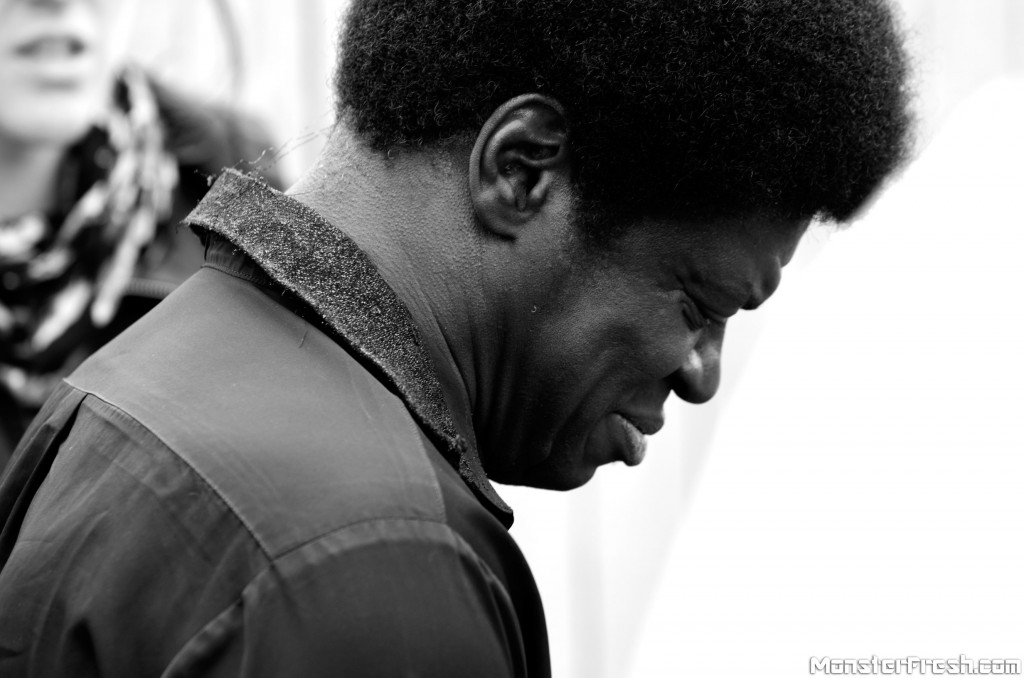
After the show, he came down to the barricade that separated the photo pit from the audience and the crowd surrounded him. He shook hands and signed a couple of autographs, but he mostly just expressed his undying appreciation for everyone that was there to share the experience with him. His own people attempted to get Charles to head backstage, but it was a futile effort for the most part; he wanted to meet everyone and wasn’t leaving that quickly.
[Side note: I should really open myself to taking more crowd shots. Just on the other side of Charles in the picture above, was some weird kid that was holding an entire water melon. The top was crudely removed and he was eating the entire thing with a spoon.]
To overthink it, it can seem almost tortuous to watch a man repeatedly relive his pain for our enjoyment–it’s not uncommon for him to cry throughout his own sets–but it’s clearly a cleansing, cathartic, and almost necessary process for him to go through. As I’ve stated throughout, it’s much less about the pain as it is about the ability to pull through it. Charles Bradley is like a miraculous machine that has the ability to take in cold, terrible, gut wrenching tragedy and process it into pure, inexplicable beauty and spirited grace. He’s the type of artist whose story is so moving that you can’t help but want him to succeed, but he’s much more than that, because he’s actually a truly amazing performer and his talent extends much larger than just his intriguing bio. I could get myself raped and stabbed tomorrow, but it’s not going to help me play the banjo like Bela Fleck. His talent is what carries him. Like the rest of the Daptone roster, Charles is way too legitimate to be minimized by a simple “revivalist” label. Beyond the fact that he’s been making this type of music for most of his life, the sound that he’s creating feels as current and timeless as anything. Not only did he deliver one of the top sets of the day, but he put on one of the top few sets of the entire weekend–if not thee top–and, without a doubt, one of the greatest shows that I’m likely to see all year. It was remarkable and a show that I know will have just as much heart in it if I ever get the chance to see him again. The only real issue was that almost everything else that I’d see from that point would be compared to the first set that I caught in the day, and it was an incredibly tough act to follow.
A documentary about Charles has been making the rounds at various film festivals. I made the mistake of missing it’s recent screenings at the Seattle International Film Festival. Don’t make the same mistake. Visit the official site for the film by clicking HERE and check out the official trailer below.
